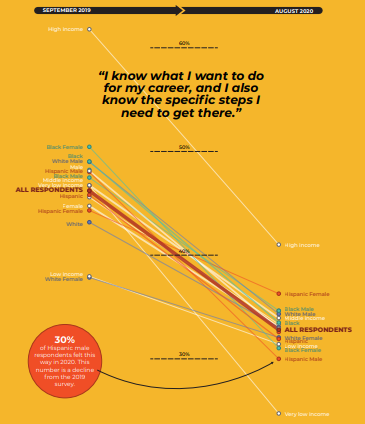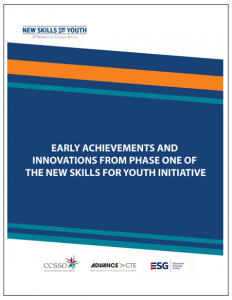New Survey Data Illuminates the Impact of the Pandemic on Black and Latinx Youth and Youth from Low-Income Families
In the early spring, the COVID-19 (coronavirus) pandemic was often referred to as “The Great Equalizer.” After all, pandemics are equal opportunity threats and we all have to wear masks and attend meetings and classes on Zoom. But as the pandemic wore on, it became immediately clear that it would have disproportionate impacts, exacerbating racial and economic inequities that have long existed in the public education system and in the workforce. Without action from state and local leaders, the pandemic could have long-lasting impacts on young people, particularly Black and Latinx youth and youth from low-income families.
The Great Recession of 2008 provides some insights into the threat of the current coronavirus economic crisis. Five years after the Great Recession, youth unemployment was at an all-time high, impacting the career success of Millennials through the present day. Back in 2013, the Center for American Progress projected that young people would lose out on more than $20 billion in earnings over the next 10 years – and many are still struggling with debt and underemployment as a result of the recession.
Today, an emerging generation of young people – often referred to as Generation Z or “Gen Z” – stands at a similar precipice. We are already seeing early warning signs that the pandemic and related economic recession will impact their plans for education and career success.
How Are Young People Responding to the Pandemic?

New research from Goodwin Simon Strategic Research, funded by Equitable Futures, a project of the Bill & Melinda Gates Foundation, illuminates the impact the coronavirus pandemic is having on young people. In September, the organization released results from the first of four national surveys examining the pandemic’s impact on Black and Latinx youth and youth from low-income families.
One alarming takeaway from the research is that young people are taking on additional economic burdens as a result of the pandemic. Sixteen percent of respondents reported losing income due to decreased work hours or less business, and eight percent have lost an internship, apprenticeship or similar opportunity.
At the same time, young people are taking on additional responsibilities at home. Thirty-two percent of respondents say they are providing care for a younger member of their household, such as a younger sibling, with Black and Latinx youth responding at the highest rates.
As a result, young people are reconsidering their future academic and career plans. More than half of respondents say they value college differently now, with 28 percent reporting that they used to think college would be worth it but now think college is not worth it. Additionally, fewer young people have clarity about their goals and ideas for their futures than they did before the pandemic. In 2019, 43 percent of respondents said they felt clear about their future goals, compared to 27 percent in 2020 — a drop of 16 percentage points.
The coronavirus may not be the great equalizer, but it is the great disrupter. It may be years before we know the full impact of the pandemic and related economic crisis, but we know enough now to see that young people have been interrupted in their pursuit of education and career success in ways that will likely impact credential attainment, employment and earnings for years to come.
Trying Times Require Strong State Leadership
As a nation, we are at a crossroads, and states have a critical role to play in minimizing the impact of the Coronavirus on Black and Latinx learners and learners from low-income families. What can state leaders do to support young people in this time of crisis?
For one, they can provide clear information and guidance to help learners make informed decisions about their academic and career goals. This includes providing clear, transparent information about high-skill, high-wage and in-demand careers, the credentials needed to access those careers, and affordable opportunities to earn those credentials.
Additionally, with many young people experiencing loss of income as a result of the pandemic, state leaders can strengthen earn and learn opportunities so young people are not forced to choose between education and work. Paid work-based learning opportunities like youth apprenticeships are a proven way to build technical and employability skills on the job.
And finally, states can monitor data — including additional research from Goodwin Simon — to understand how Black and Latinx youth and youth from low-income families are being impacted by the pandemic and respond accordingly.
Early data is already illuminating the disastrous effects of the pandemic. State and local leaders can act now to pave the road to economic recovery and well-being for those who have been most impacted by the crisis.
Austin Estes, Manager of Data & Research, Advance CTE


 Last spring, 24 states and Washington, D.C. began a national, six-month effort to examine and transform their career readiness systems and expand opportunities available to students in their states. Under the initiative, part of JPMorgan Chase & Co.’s $75 million
Last spring, 24 states and Washington, D.C. began a national, six-month effort to examine and transform their career readiness systems and expand opportunities available to students in their states. Under the initiative, part of JPMorgan Chase & Co.’s $75 million